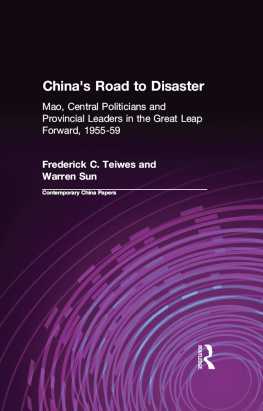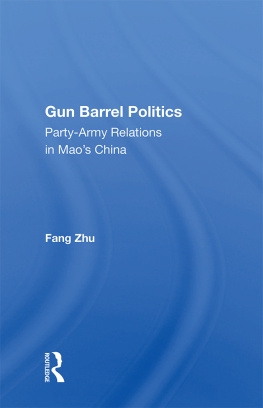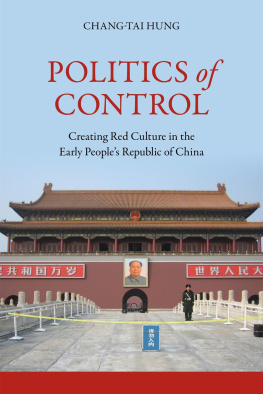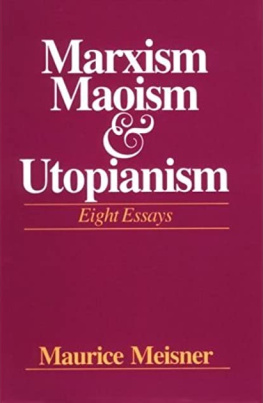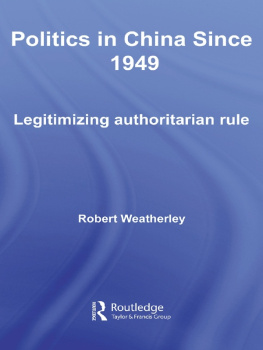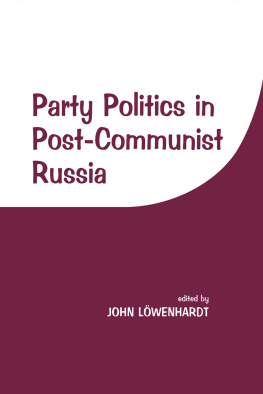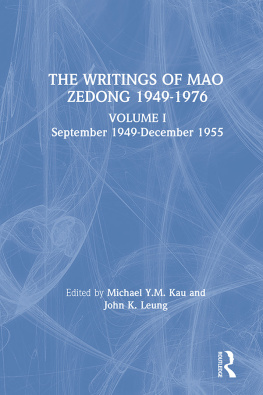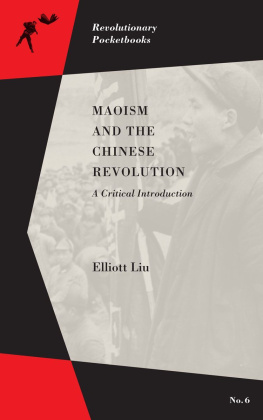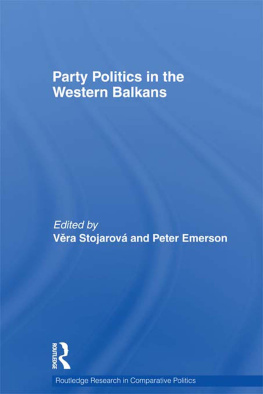POLITICS AT MAO'S COURT
Studies on Contemporary China
THE POLITICAL ECONOMY OF CHINA'S SPECIAL ECONOMIC ZONES
George T. Crane
WORLDS APART
RECENT CHINESE WRITING AND ITS AUDIENCES
Howard Goldblatt, editor
CHINESE URBAN REFORM
WHAT MODEL NOW?
R. Yin-Wang Kwok, William L. Parish, and Anthony Gar-On Yeh with Xu Xueqiang, editors
REBELLION AND FACTIONALISM IN A CHINESE PROVINCE
ZHEJIANG, 1966-1976
Keith Forsler
POLITICS AT MAO'S COURT
GAO GANG AND PARTY FACTIONALISM IN THE EARLY 1950s
Frederick C. Teiwes
Studies on Contemporary China
Politics at Mao's Court
Gao Gang and Party Factionalism in the Early 1950s
Frederick C. Teiwes
An East Gate Book
First published 1990
by M.E. Sharpe
Published 2015
by Routledge
2 Park Square, Milton Park, Abingdon, Oxon OX14 4RN
711 Third Avenue, New York, NY 10017, USA
Routledge is an imprint of the Taylor & Francis Group, an informa business
Copyright 1990 Taylor & Francis. All rights reserved.
No part of this book may be reprinted or reproduced or utilised in any form or by any electronic, mechanical, or other means, now known or hereafter invented, including photocopying and recording, or in any information storage or retrieval system, without permission in writing from the publishers.
Notices
No responsibility is assumed by the publisher for any injury and/or damage to persons or property as a matter of products liability, negligence or otherwise, or from any use of operation of any methods, products, instructions or ideas contained in the material herein.
Practitioners and researchers must always rely on their own experience and knowledge in evaluating and using any information, methods, compounds, or experiments described herein. In using such information or methods they should be mindful of their own safety and the safety of others, including parties for whom they have a professional responsibility.
Product or corporate names may be trademarks or registered trademarks, and are used only for identification and explanation without intent to infringe.
Library of Congress Cataloging-in-Publication Data
Teiwes, Frederick C.
Politics at Mao's court: Gao Gang and party factionalism in the early
1950s / Frederick C. Teiwes.
p. cm. (Studies on contemporary China)
Includes bibliographical references
ISBN 0-87332-590-7 ISBN 0-87332-709-8 (pbk.)
1. ChinaPolitics and government1949-1976. 2. Chung-kuo kung
ch'an tangPurges. 3. Kao, Kang. I. Title. II. Series.
DS777.75.T442 1990
951.05'5dc20 90-35927
CIP
ISBN 13: 9780873327091 (pbk)
ISBN 13: 9780873325905 (hbk)
To Inge and Jack
Contents
| Beijing Politics, Late 1952-Mid-1953 |
| The National Conference on Financial and Economic Work, June-August 1953 |
| The Organization and Agricultural Cooperativization Conferences, September-November 1953 |
| Gao Gang's Approaches to Party Leaders in the South and Beijing, Summer-Fall 1953 |
| December 1953 and After |
| Politics at Mao's Court |
| January-May 1953 |
| June-August 1953 |
| July-October 1953 |
Organizations and Policies
- CCP Chinese Communist Party
- FEC Financial and Economic Committee
- FFYP First Five-Year Plan
- GAC Government Administration Council
- NPC National People's Congress
- PLA People's Liberation Army
- PRC People's Republic of China
- SPC State Planning Commission
Publications and Publishing Agencies
- AJCA Australian Journal of Chinese Affairs
- CB Current Background
- CLG Chinese Law and Government
- CQ The China Quarterly
- DSYJ Dangshi Yanjiu [Research on Party History]
- FBIS Foreign Broadcast Information Service
- NCNA New China News Agency
- RMRB Renmin Ribao [People's Daily]
- SCMM Selections from China Mainland Magazines
- SCMP Survey of China Mainland Press
- SW Selected Works of Mao Tsetung
- WM The Writings of Mao Zedong, 1949-1976
- WS Mao Zedong Sixiang Wansui [Long Live Mao Zedong Thought]
- WS 1949-57 Mao Zedong Sixiang Wansui 1949.9-1957.12 [Long Live Mao Zedong Thought, September 1949-Dccemhcr 1957]
- ZDJCZ Zhonggong Dangshi Jiaoxue Cankao Ziliao [CCP History Teaching Reference Materials]
- ZDRZ Zhonggong Dangshi Renwu Zhuan [Biographies of Personalities in CCP History]
THIS STUDY began as a relatively narrow reexamination of one of the most elusive cases of Chinese Communist leadership conflict, the 1953-54 Gao Gang-Rao Shushi affair, on the basis of substantial new information from the post-Mao period. While the present account remains very much a detailed analysis of and, indeed, something of a detective story about this obscure conflict, it soon became apparent that the investigation had broader implications concerning the nature of elite politics in the Maoist era. Basic questions of power, policy, ideology, factions, and patterns of leadership interaction generally are all central to the unfolding story. The illumination these issues receive in the context of the Gao-Rao case is relevant not only to the initial post-1949 period of comparativebut flawedParty unity, but also to the structural fault lines of the political system that were later to contribute so significantly to the Cultural Revolution. The ultimate aim of the book is to home in on these structural features of the Maoist system, which were to have such momentous consequences long after the Gao-Rao affair.
Coming back to the Gao-Rao case after a decade is in some ways a humbling experience. This is not particularly due to the fact that some of the main propositions offered in my 1979 analysis in Politics and Purges in China have proven considerably wide of the mark. Indeed, in a fundamental sense the basic theme of Mao's unchallenged position, which underlay the earlier analysis, has been strengthened and clarified by the new data available. Humility is rather engendered by the awareness that my previous interpretation was stated with a degree of certitude not justified by the information then available. It is further created by the realization that even with new, much more revealing post-Mao data, points that seemed clear in both draft form and several brief published accounts of the case have become problematic as further evidence has been unearthed. In fact, the very nature of the matter under investigation means many aspects of the present analysis lie beyond anything approaching definitive proof. The result, then, is an account that may have to be further amended as new evidence appears or particularly perplexing issues are thrashed out with Chinese scholars in the future.


